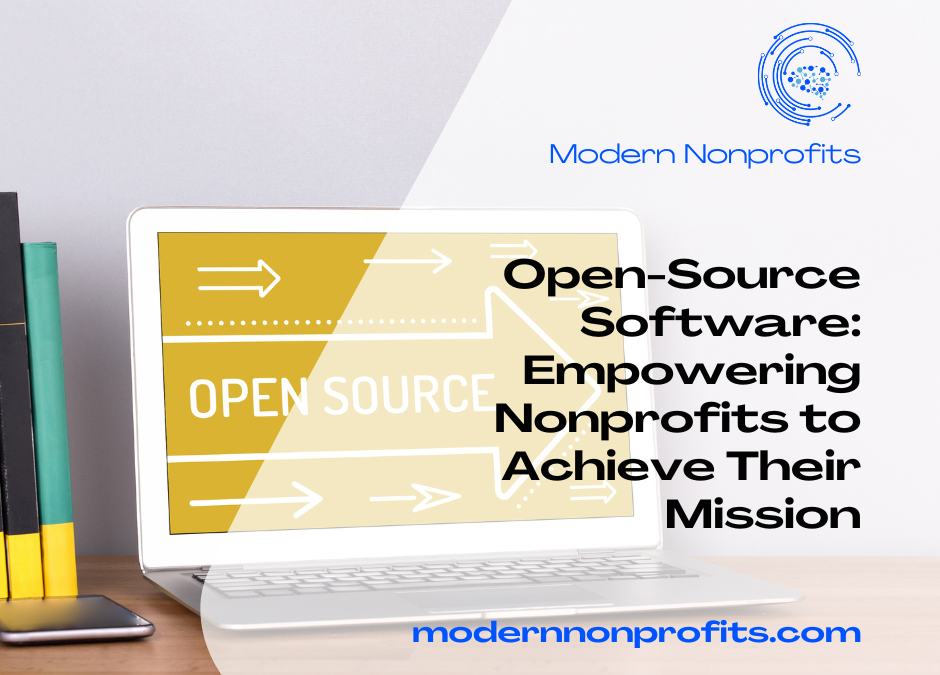Nonprofits play a crucial role in addressing some of society’s most pressing challenges, from poverty and inequality to environmental sustainability and human rights. However, limited resources and funding can make it challenging for nonprofits to access the tools and technologies they need to achieve their mission. Open-source software can provide an effective solution, offering nonprofits free access to powerful and customizable software that can help them manage their operations, engage with stakeholders, and achieve their goals more efficiently. In this article, we will explore the benefits of open-source software for nonprofits, as well as some examples of popular open-source software solutions that can be beneficial for nonprofit organizations.

In today’s world, nonprofit organizations have to be innovative and efficient to make a real difference. One way to achieve this is through the use of open-source software, which can help nonprofits reduce costs while also benefiting from the collective expertise of a global community of developers.
Open-source software is software that is freely available for anyone to use, modify and distribute. This makes it an ideal solution for nonprofits that may not have the financial resources to invest in expensive proprietary software. Open-source software can provide a range of features and functionality to nonprofits, such as project management, customer relationship management, and accounting software.
One of the most significant benefits of open-source software is the community of developers that supports it. This community is comprised of individuals and organizations that collaborate to improve the software, fix bugs, and add new features. This means that nonprofits can benefit from the expertise of the community and receive support from developers all over the world. Moreover, the community ensures that the software stays up-to-date with current technology trends and security protocols.
Open-source software can also offer a high degree of flexibility, allowing nonprofits to customize the software to fit their specific needs. For example, a nonprofit can tailor its project management software to include customized reports and workflows that fit its unique requirements. This flexibility can be particularly valuable for nonprofits that operate in multiple countries, languages, and currencies.

When considering open-source software for nonprofits, it is essential to choose software that is user-friendly and easy to learn. Fortunately, many open-source software solutions have user-friendly interfaces and a range of resources available for training and support. This makes it easy for nonprofits to transition to open-source software and ensure that their staff can use it effectively.
Finally, nonprofits should consider the long-term sustainability of the software they choose. Open-source software projects can sometimes be abandoned if developers lose interest or if funding dries up. For this reason, it is important to choose software that has an active community and a long-term roadmap for development and support.
In conclusion, open-source software is an excellent choice for nonprofits looking to save costs and leverage the expertise of a global community of developers. With its flexibility, community support, and potential for customization, nonprofits can choose the software that best meets their unique needs. Furthermore, open-source software is user-friendly and can be easily learned and implemented by staff members. By selecting the right open-source software, nonprofits can ensure that they have a sustainable solution that will support their work for years to come.

The Benefits of Open Source Software for Nonprofits
- Cost Savings: Open-source software is typically free to use, which can significantly reduce the costs associated with purchasing and maintaining proprietary software. This allows nonprofits to allocate their resources to other important aspects of their mission.
- Customization: Open-source software is highly customizable, allowing nonprofits to modify the software to fit their specific needs. This can include creating custom reports, adding new features, or integrating the software with other systems.
- Community Support: Open-source software is developed and supported by a community of developers who collaborate to improve the software and provide support to users. This community can be an invaluable resource for nonprofits, providing access to a wealth of knowledge and expertise.
- Security: Open-source software is typically subject to rigorous testing and peer review, which can help identify and address security vulnerabilities. This can help keep nonprofit data and systems safe from cyber threats.
- Long-Term Sustainability: Open-source software projects are often supported by dedicated communities of developers and users who are committed to the long-term sustainability of the software. This can help ensure that the software will continue to be updated and improved over time.
- Interoperability: Open-source software is often designed to be interoperable with other systems and software, making it easier for nonprofits to integrate it with their existing systems and workflows.
Overall, open-source software can provide nonprofits with a range of benefits, including cost savings, customization, community support, security, long-term sustainability, and interoperability. By leveraging the power of open-source software, nonprofits can operate more efficiently, reduce costs, and focus on achieving their mission.

Examples of Open Source Software for Nonprofits
- CiviCRM: CiviCRM is an open-source customer relationship management (CRM) software that can help nonprofits manage their contacts, donations, events, and more. It is highly customizable and has a robust community of developers who provide support and continually add new features.
- Odoo: Odoo is an open-source enterprise resource planning (ERP) software that can help nonprofits manage their finances, inventory, and other business operations. It also includes modules for project management, human resources, and e-commerce.
- LibreOffice: LibreOffice is an open-source office suite that can help nonprofits create and edit documents, spreadsheets, and presentations. It is compatible with Microsoft Office and includes features such as advanced formatting, formula editors, and a database creator.
- WordPress: WordPress is an open-source content management system (CMS) that can help nonprofits create and manage their website. It is highly customizable and includes thousands of free and paid themes and plugins to add features and functionality.
- GNUCash: GNUCash is an open-source accounting software that can help nonprofits manage their finances. It includes features such as double-entry accounting, invoicing, and financial reports.
- OpenProject: OpenProject is an open-source project management software that can help nonprofits manage their projects and tasks. It includes features such as Gantt charts, time tracking, and collaboration tools.
- Nextcloud: Nextcloud is an open-source file-sharing and collaboration software that can help nonprofits share files and collaborate with their team members. It includes features such as file syncing, encryption, and team chat.
These are just a few examples of the many open-source software solutions available for nonprofits. By choosing the right software for their needs, nonprofits can benefit from the flexibility, customization, and community support of open-source software.

In conclusion, open-source software is a powerful tool that can help nonprofits achieve their mission more efficiently and effectively. By leveraging the benefits of open-source software, such as cost savings, customization, community support, security, long-term sustainability, and interoperability, nonprofits can focus their limited resources on their core mission and better serve their communities. The examples of open-source software solutions presented in this article demonstrate the wide range of tools available to nonprofits, from CRM and project management software to accounting and website management tools. Nonprofits can benefit greatly from the flexibility, customization, and community support that open-source software provides, making it a valuable resource for organizations seeking to create a positive social impact.



Thank you for sharing about Open-Source Software; very helpful indeed.
When we were planning to put up a nonprofit organization in our community, it never crossed our mind that we’ll be needing software. However, as we were looking into the means of raising funds, we realized that we just couldn’t do it without the help of technology. I realized that gone were the days when nonprofit organizations could easily ask for financial help from generous, wealthy people, or politicians for that matter. ☺
Nowadays, nonprofit organizations have to leverage free software to help them succeed, especially if they are just starting out. By the way, can we use more than just one of these Open-Source software because there are features in some that are not offered in others? For instance, I like WordPress but it cannot help us with presentations and spreadsheets.
Hi Alice,
I’m glad to hear that you found my information about Open-Source software helpful for your nonprofit organization. It’s great that you recognize the value of technology and its importance in raising funds for your cause.
To answer your question, yes, you can definitely use more than one Open-Source software for your organization. In fact, many nonprofits use multiple software tools to meet their specific needs. For example, you could use WordPress for your website and then use Google Sheets or LibreOffice Calc for spreadsheets.
It’s important to assess your organization’s needs and find the software that will best meet them. You may find that some software tools work better together than others, or that there are integrations available to make your workflow smoother.
I wish you all the best in your nonprofit endeavors and hope that you find the right software tools to support your cause. Let me know if you have any further questions!
I am extremely grateful for the insight you shared regarding Open-Source Software. It was incredibly beneficial! Nonprofit organizations today are taking advantage of free software to find success, especially those just starting out. This is a smart move which can have great benefits for the organization and its mission. I think it is extra wise because in the long run you’ll get more out of it.
I am glad you found my article beneficial. For organizations, especially those that are just starting out, utilizing open-source software can be a wise decision because it allows them to cut expenditures while still having access to effective tools and resources. Instead of wasting time and money on pricey software licenses and upgrades, using open-source software can help NGOs concentrate more of their resources on their essential goals and tasks. I’m glad to hear that you see the benefits of utilizing open-source software, it may be quite advantageous for charity organizations.